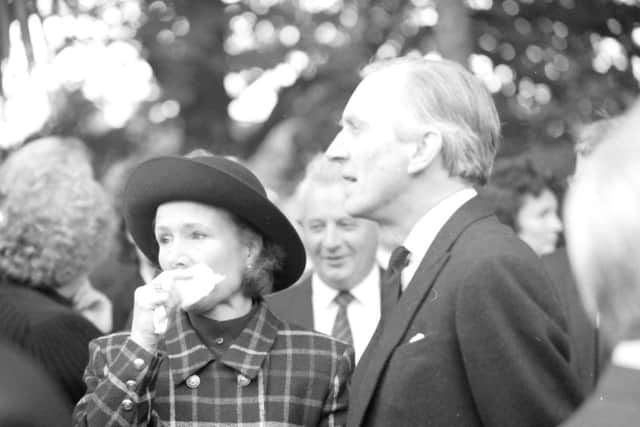Declassified files: Lord Chief Justice robustly opposed '˜damaging' 1989 anti-terror law
and live on Freeview channel 276
Sir Brian Hutton, who would go on to become a Law Lord and then chair the 2003 public inquiry into the death of scientist David Kelly, was Northern Ireland’s most senior judicial figure when in 1989 he was asked to comment on the proposals from home secretary Douglas Hurd.
The proposal, which appears to have been part of a government effort to make it easier to secure convictions against terrorists without revealing intelligence to the defendant, met with staunch opposition from Sir Brian.
Advertisement
Hide AdAdvertisement
Hide AdThe Lord Chief Justice, who himself had been a long-standing target of the IRA and who had seen several of his judicial colleagues murdered or almost murdered by terrorists, wrote back in robust terms to the Lord Chancellor.


The letter was then re-sent to the government in 1993, this time to the then secretary of state Sir Patrick Mayhew, following a conversation between Sir Patrick and Sir Brian, and it is that version which has been declassified under the 20-year rule at the Public Record Office in Belfast.
An “urgent” covering letter in 1993 from Sir Brian’s principal secretary, David Lavery, said that the Lord Chief Justice “continues to adhere to the views expressed in the enclosed letter”.
In that 1989 letter Sir Brian set out Home Office proposals which he said would have involved a judge receiving a written application from police “containing information in relation to the detained person which would not be furnished to that person or his legal representative”.
Advertisement
Hide AdAdvertisement
Hide AdHe said that the proposal would also have involved the judge going to where someone was being held “where he would hear the police in the absence of the detained person and his legal representative”, followed by the detained individual being brought before the judge “but it is clear that, even though requested to do so by the detained person’s legal representative, the judicial officer would not be permitted to disclose to the detained person or his legal representative the information given to him by the police”.
Sir Brian said: “If the judges in Northern Ireland acted as ‘judicial officers’ in this procedure I consider that it would involve them in a procedure which could not be regarded as judicial in the sense in which that term is used in the British system of justice and which would be the antithesis of a judicial proceeding because the judicial officer, in deciding to deprive a person of his liberty, would be acting on information (which in itself would often be inadmissible under the normal rules of evidence) which he refused to disclose to that person.”
He said that “the reality in many cases would be that the judicial officer would be asked to sanction the continued detention of a suspect on the basis of intelligence information which could not be disclosed to the suspect”.
“I consider that if the judges in Northern Ireland were to take part in such a procedure it would very gravely damage their standing and position as judges, and the harm would be increased by the need for judges to go to a detention centre under the control of the police to perform their functions under the suggested procedure.”
Advertisement
Hide AdAdvertisement
Hide AdSir Brian quoted from Lord Diplock, who said that despite Northern Ireland’s tribalised nature “the judiciary has nevertheless managed to retain a reputation for impartiality which rises above the divisive conflict which has affected so many other functions of government in the province; and the courts of law and the procedures that they use have in general held the respect and trust of all except the extremists of both factions”. We regard it as of paramount importance that the criminal courts of law and judges...should continue to retain that respect and trust throughout the emergency and after the emergency has come to an end. If anything were done which weakened it, it might take generations to rebuild, for in Northern Ireland memories are very long.”
Sir Brian also said that in purely practical terms it would be impossible, given the relatively small number of Northern Ireland judges, for a judge to go to a detention centre to consider an application 300 or 400 times a year.
Sir Brian said that he was aware that the Lord Chief Justice of England and Scotland’s Lord Justice General had “agreed, with some misgivings” to take part in the procedure. However, he said that “with respect, I remain firmly of the opinion that if a choice has to be made between involving the judiciary in Northern Ireland in a procedure which would leave them open to unanswerable criticism and which would very gravely damage their standing ... the choice should be [not to do so].